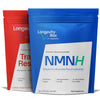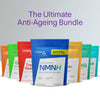The Ultimate NAD Support Bundle
✅ No additives, preservatives or bulking agents
✅ Proven results. Backed by science
Measurable Results From Day 1





After 2 Weeks
After 6 Weeks
After 12 Weeks
After 6 Months
The Longevity Box Standard: Proof, Not Promises





Description
Introducing our ultimate stack to boost NAD levels:
- NMNH
- Apigenin
- TMG
Save 20% when you buy as a bundle!
NMNH
NMNH is the next generation in NAD+ precursors, offering a revolutionary advancement in boosting NAD+ levels, with research demonstrating that it increases NAD+ levels up to 3x more effectively than traditional NMN. NAD+ is a vital coenzyme that drives numerous cellular processes, including energy production, DNA repair, and mitochondrial function. Here's how NMNH supports these critical functions in the body:
Enhanced NAD+ Synthesis: NMNH is rapidly converted into NAD+ within cells. By delivering this powerful precursor more efficiently than NMN, NMNH ensures a faster and higher surge in NAD+ levels, enabling robust cellular energy production and optimal metabolic function. NAD+ powers energy pathways such as glycolysis, the citric acid cycle, and oxidative phosphorylation, all of which are central to generating adenosine triphosphate (ATP)—the primary energy source of the body.
High-Efficiency ATP Generation: NMNH's ability to elevate NAD+ amplifies ATP production within the mitochondria. NAD+ drives oxidative phosphorylation, a process where electrons flow along the mitochondrial electron transport chain, pumping protons to create an electrochemical gradient. This gradient powers ATP synthase, allowing the production of ATP from ADP and inorganic phosphate, fueling every cellular function.
Mitochondrial Optimisation: Mitochondrial health is sustained and enhanced by NMNH-driven NAD+ levels. Mitochondria depend on sufficient pools of NAD+ for maintaining efficient energy production and cellular respiration. By supporting mitochondrial efficiency, NMNH helps prevent the decline in energy metabolism commonly associated with ageing and metabolic dysfunction.
DNA Repair Strengthened: NAD+ is essential for activating enzymes like PARPs (poly-ADP ribose polymerases), which repair DNA damage caused by environmental and internal stressors. NMNH’s superior NAD+ boosting ability enhances these repair processes, safeguarding the integrity of the genome and promoting cell survival.
Sirtuin Activation for Longevity: NMNH bolsters the activity of sirtuins, a family of NAD+-dependent enzymes involved in regulating metabolism, stress responses, and ageing. Elevated NAD+ levels help sirtuins modulate cellular processes related to longevity and resilience, contributing to improved energy balance and healthy ageing.
Potent Support for Redox Reactions: NAD+ is integral to cellular redox reactions, which involve the transfer of electrons that drive energy conversion and storage within cells. NMNH ensures a stable supply of NAD+ for these reactions, supporting efficient energy transfer and metabolic homeostasis.
Neuroprotection and Cellular Health: NMNH’s unprecedented capacity to enhance NAD+ levels also benefits brain health and longevity. By supporting energy production and combating oxidative stress, NMNH aids in protecting neurons from age-related decline while promoting overall cellular vitality.
NMNH represents a cutting-edge development in NAD+ supplementation. Its ability to drive NAD+ levels 3x higher than NMN translates to greater energy production, enhanced cellular repair, mitochondrial function, and overall health, making it a promising tool for healthy ageing and optimal cellular performance.
Apigenin
While NMN can help rejuvenate our NAD levels, we must also take into account the influence of an enzyme known as CD38 in the process. As we grow older, the activity of CD38 escalates, leading it to consume our valuable NAD resources, thus hindering their integration into the cellular energy cycle.
Recent research conducted by the Buck Institute has shown the root cause of this, attributing it to age-associated inflammation. This process, referred to as 'inflammaging', is intricately linked to the actions of immune cells called 'macrophages' that attempt to counteract age-related deterioration. Tackling this challenge requires the expression of CD38 enzymes within this process.
Apigenin is a flavonoid compound found in certain foods and has been studied for its potential health benefits, including antioxidant and anti-inflammatory properties. Apigenin acts to suppress CD38 activity within cells, thereby fostering a rise in NAD+ levels.
NAD Degradation: CD38 is primarily known for its role in the degradation of NAD+. It enzymatically cleaves NAD+ into nicotinamide and ADP-ribose, which are precursor molecules that can be further metabolised. This process is part of the cellular regulatory system that helps manage NAD+ levels.
NAD Recycling: While CD38 contributes to the breakdown of NAD+, it also participates in the salvage pathway for NAD+ synthesis. The breakdown products generated by CD38, such as nicotinamide and ADP-ribose, can be used by cells to synthesise new NAD+ molecules through the NAD salvage pathway.
Ageing and NAD Depletion:CD38 activity has been associated with ageing-related NAD+ depletion. As we age, CD38 activity may increase, leading to increased degradation of NAD+. This reduction in NAD+ levels can have implications for cellular health and the ageing process. Strategies that inhibit CD38 activity or boost NAD+ synthesis, such as supplementation with NAD precursors like NMN or NR, have been explored as potential interventions for age-related health issues.
Immunomodulation: CD38 is also involved in immune cell function and regulation. It plays a role in calcium signaling and the release of inflammatory molecules. CD38 inhibitors are being investigated for their potential to modulate immune responses and manage inflammatory conditions.
TMG
Trimethylglycine (TMG), also known as betaine, is a naturally occurring compound found in various foods. It has been studied for its potential health benefits, including its role in supporting NMN and NAD+ levels in the body. Here's how TMG contributes to NMN and NAD+ metabolism:
Methylation Support: TMG is involved in a biochemical process called methylation, which is essential for various cellular functions. Methylation reactions are involved in the synthesis of molecules like NMN and NAD+. TMG can provide methyl groups that are used in the conversion of different compounds, potentially supporting the production of NMN and NAD+.
Conversion of Homocysteine: TMG plays a role in the methionine cycle, a process that converts homocysteine (an amino acid) into methionine. This cycle is closely linked to NAD+ metabolism because one of the intermediates, S-adenosylmethionine (SAM), is required for NAD+ synthesis.
NAD Salvage Pathway:TMG may indirectly support the NAD salvage pathway. This pathway involves the recycling of nicotinamide (a breakdown product of NAD) back into NAD+ through a series of enzymatic reactions. The availability of methyl groups from TMG can influence these reactions and contribute to NAD+ synthesis.
DNA Methylation and Repair:
Adequate methylation is crucial for DNA methylation and repair processes, which are linked to cellular health. These processes are also associated with NAD+ levels. TMG's role in methylation can indirectly contribute to maintaining DNA integrity and supporting NAD-dependent DNA repair mechanisms.
Mitochondrial Function: TMG can affect mitochondrial function and energy metabolism. Healthy mitochondria are vital for efficient NAD+ production and cellular energy production.
BE MORE JELLYFISH
The science of Longevity is growing at breakneck speed and tens of BILLIONS of dollars are being invested in solutions to help us all slow aging. But until 'Longevity Escape Velocity' has been achieved, we should all be more like Turritopsis Dohrnii jellyfish - which do not age - and we should invest in our long-term health with a healthy lifestyle, supported by longevity supplements.
Worldwide
Guarantee
Payment
Policy




